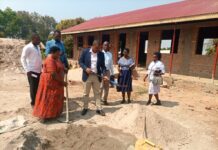The government’s decision to fully reopen special needs schools has taken several administrators by surprise. While issuing guidelines for the reopening of educational institutions, the Education and Sports Ministry gave green light to international schools and those with special needs learners to reopen at full capacity.
The authorities argued that schools in both categories have a limited number of students enrolled and can ably comply with the Standard Operating Procedures-SOPs. However, administrators of some of the special needs schools visited by our reporter said the announcement caught them unawares.
Winnie Kyobutungi, the General Welfare Manager at Kampala School for Physically Handicapped-KSPH said they were all along preparing for candidates until Saturday when officials from the department of education at Kampala Capital City Authority visited themand told them they will reopen at full capacity.
“We had already put in place all that is required to receive the candidates until when KCCA School Inspectors came here. They informed us about the expected full capacity reopening. This was news to us,” said Kyobutungi.
Jackson Twinomucunguzi, a teacher at KSPH, says they didn’t receive any official communication from government about the decision. He, however, says they have been forced to go back to the drawing board and plan for the other classes.
The situation was no different at Mulago School for the Deaf. The School Headteacher, Pius Okecho also told Pearl FM that he only received information over the weekend that they are expected to reopen at full capacity.
Sarah Bugoosi Kibooli, the Commissioner in Charge of Special Needs Education told URN that the Education Ministry Permanent secretary is expected to issue an official circular on the reopening of special needs schools. She, however, says that they expect most of them to reopen given their population.
Richard Katongole, the headteacher of Wakiso Secondary School for the Deaf told URN that despite the fact that he was yet to receive official communication, he had seen the program the guidelines and started planning for the reopening.
He, however, says with the new guidelines, his school might not be able to accommodate all the 200 students enrolled at the school. “We have decided to reopen for students in senior four, five, and six only. We don’t have enough space to accommodate all of them. We are soon going to communicate the development to parents,” he said.
The idea of reopening special needs schools was fronted by several Disability specialists and activists who poked holes in government’s plan to supply self-study materials to Special needs learners, arguing that the program would be ‘out rightly detrimental’ for many students who require a strong, close-knit network of people supporting their often multiple and complex needs.
Although special needs schools are reopening, government still have plans to distribute the self-study materials in form of large prints, braille materials, pre-recorded audio and visual content that will be placed on SD reader cards and memory sticks. Commissioner Kibooli says the self-study material will be delivered to schools to supplement teaching and learning materials.
Approximately 2.5 million children in Uganda live with some form of disability, according to an assessment by UNICEF. These include learners with muscular dystrophy, multiple sclerosis, epilepsy, Down syndrome, autism, dyslexia, processing disorders, bi-polar, oppositional defiance disorder, the visually impaired, and those with hearing impairments.
They are, however, a few special needs schools. Records show that only about 10 percent of children with disabilities can access education through special schools with five percent going through inclusive schools.


